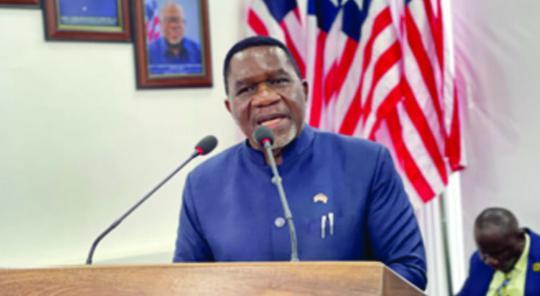Africa-Press – Liberia. Minister Kruah said many of the work permits issued to foreign nationals are for professionals with specialized technical skills.
The Minister of Labour, Cllr. Cooper Kruah, has firmly rejected accusations leveled against his Ministry by Montserrado County Senator Abraham Darious Dillon.
The Senator had alleged that the Ministry of Labour issued thousands of work permits to foreign nationals, undermining opportunities for Liberian workers. Minister Kruah described these allegations as “personal, inaccurate, and politically motivated.”
Addressing the press at a briefing on Tuesday, June 17, held at the Ministry of Information, Cultural Affairs and Tourism (MICAT) headquarters in Monrovia, Minister Kruah provided comprehensive data and explanations to clarify the Ministry’s stance and operations regarding work permits.
Minister Kruah emphasized that in 2024, the Ministry processed a total of 10,974 work permit applications. However, he clarified that 75 percent of these permits were renewals for expatriates already legally employed in Liberia before the current administration came into office. Only 25 percent represented new work permits issued.
“The narrative that thousands of new permits are being handed out to foreigners to the detriment of Liberian workers is false,” Minister Kruah stated firmly. “In reality, out of the permits processed in 2024, 7,686 were renewals, while just 2,484 were new permits.”
He further explained that among the applications received, 8,792 were regular work permits mainly for expatriate workers, 887 were gratis permits issued to UN staff, professors, doctors, and other essential personnel exempt from fees, and 438 were issued to ECOWAS citizens. Additionally, 857 applications were denied after due consideration.
Minister Kruah revealed that the Ministry collected US $9.7 million in work permit fees in 2024. However, he clarified that these funds were not deposited into the Labour Ministry’s accounts but paid directly to the Liberia Revenue Authority (LRA). This, he said, is an important safeguard that ensures transparency and accountability in financial management.
“Our Ministry does not collect or handle work permit fees directly. The Liberia Revenue Authority oversees all payments, reinforcing the integrity of the process,” the Minister explained.
According to Minister Kruah, many of the work permits issued to foreign nationals are for professionals with specialized technical skills that remain scarce within Liberia, particularly in industries such as deep mining and industrial operations.
“For example, mining work at Bea Mountain requires workers to operate 30 minutes underground, a task currently managed by highly trained expatriate staff. However, we are actively training Liberians to assume these roles in the future,” he said.
The Minister provided a breakdown of expatriate nationalities among permit holders, noting that 6,980 of the 8,792 regular permits (69%) went to workers from Lebanon and India. Another 2,699 (27%) were issued to non-ECOWAS Africans, including professionals from South Africa and Zambia, and 558 (4%) went to ECOWAS nationals.
Minister Kruah cited Chapter 45 of the Decent Work Act, which stipulates that work permits are only issued when no qualified Liberian is available to fill a position. Companies receiving permits must also commit to training Liberians to fill future vacancies.
“When we deny a work permit, formal rejection letters are issued. The entire process is documented and transparent,” Kruah emphasized. “We remain steadfast in enforcing regulations that prioritize Liberian employment while facilitating necessary foreign expertise.”
The Minister disclosed that the Labour Ministry regularly submits detailed work permit data to the Legislature upon request, reiterating its openness and willingness to cooperate with lawmakers.
“We have provided the Senate Labor Committee with comprehensive information, including names, job titles, and company affiliations of expatriate workers,” Kruah said. “We urge all stakeholders to support institutional processes instead of publicly undermining our work.”
Addressing concerns that foreign work permits are displacing Liberian workers, Minister Kruah presented employment statistics showing significant job growth for Liberians at major employers.
According to the data, Bea Mountain’s Liberian workforce increased from 2,767 employees in 2023 to 4,671 in 2024, a rise of 1,904 jobs. Sethi Brothers saw growth from 1,573 to 2,386 employees; the Metallurgical Company of Liberia (MCL) expanded from 1,645 to 2,244 employees, and Firestone Liberia’s workforce grew from 4,827 to 5,332 employees during the same period.
“These increases reflect a healthier investment climate and well-targeted labor policies,” Kruah stated. “They are clear evidence that Liberian workers are not being replaced but rather gaining more employment opportunities.”
Minister Kruah also highlighted the Ministry’s active role in mediating labor disputes across Liberia. He cited recent successful interventions at Firestone in Margibi County, MNG Gold in Grand Bassa, and a major labor standoff in Buchanan involving African workers.
In a move to improve labor market data, Minister Kruah announced a partnership with the Liberia Institute of Statistics and Geo-Information Services (LISGIS) to conduct an updated labor force survey. The latest survey, covering 2022 to 2023, indicates a national unemployment rate of 3.7 percent.
“Our commitment is to ensure transparency, fairness, and opportunity for all Liberians,” Kruah said. “We will continue to implement policies that support economic development while safeguarding the interests of Liberian workers.”
For More News And Analysis About Liberia Follow Africa-Press






